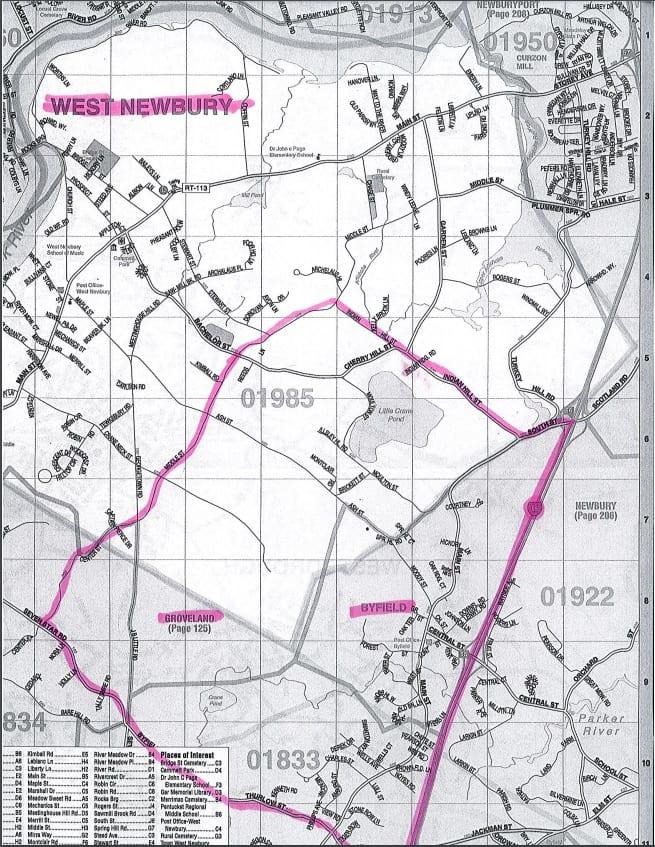Portions of Groveland, Newbury and West Newbury to Undergo Truck-Based Mosquito Spraying Today

WEST NEWBURY — West Newbury Fire Chief Michael Dwyer, West Newbury Health Agent Paul Sevigny, Newbury Police Chief and Emergency Management Director Michael Reilly and Groveland Finance and Personnel Director Denise Dembkoski report that the Towns of Groveland, Newbury and West Newbury have been informed by the Northeast Massachusetts Mosquito Control and Wetlands Management District that portions of each community will undergo truck-based mosquito spraying tonight.
Two truck-based adulticide mosquito sprayers will be deployed to each town on Monday, beginning at 7:15 p.m. and ending at approximately 9 p.m.
The spraying will include the Frances A. Crane Wildlife Management Area west of Route 95 to Middle Street, south to Thurlow Street and north to Indian Hill Street. Officials have prepared a map to highlight the affected portion of town.
The towns of Groveland, Newbury and West Newbury are part of the Northeast Massachusetts Mosquito Control District, a state agency that provides mosquito control activities to 36 communities in the region. Groveland, Newbury and West Newbury work collaboratively with the Mosquito Control District to identify response plans. The Northeast Mosquito Control District decides how to best deploy its resources to protect communities, including where spraying occurs in each town.
The Mosquito Control and Wetlands Management District offers the following tips for residents ahead of spraying:
- Please keep pets and children indoors during the hours of the spray.
- Please refrain from nightly walks on the spray route during hours of scheduled spray activity.
- Air conditioners left on are OK.
- Close windows on the street side.
- It is OK to re-open doors/windows and let pets out 15 minutes after spray is complete.
West Newbury and Groveland remain at a “moderate” risk classification for the transmission of Eastern Equine Encephalitis (EEE), and Newbury remains at a “low” risk classification.
The Towns of Groveland, Newbury and West Newbury wish to sincerely thank the Mosquito Control District for its hard work in protecting the community.
As always, Groveland, Newbury and West Newbury officials urge all residents to read and follow these important safety tips from the Massachusetts Department of Public Health:
Avoid Mosquito Bites
- Be aware of peak mosquito hours: The hours from dusk to dawn are peak biting times for many mosquitoes. Consider limiting outdoor activities that occur during the evening or early morning. If you are outdoors at any time and notice mosquitoes around you, take steps to avoid being bitten by moving indoors, covering up and/or wearing repellent.
- Clothing can help reduce mosquito bites: Although it may be difficult to do when it’s hot, wearing long sleeves, long pants and socks while outdoors will help keep mosquitoes away from your skin.
- Apply insect repellent when you go outdoors. Use a repellent with DEET, permethrin, picaridin, IR3535 or oil of lemon eucalyptus according to the instructions on the product label. DEET products should not be used on infants under two months of age and should be used in concentrations of 30 percent or less on older children. Oil of lemon eucalyptus should not be used on children under three years of age. Permethrin products are intended for use on items such as clothing, shoes, bed nets and camping gear and should not be applied directly to your skin.
Mosquito-Proof Your Home
- Drain standing water: Many mosquitoes lay their eggs in standing water. Limit the number of places around your home for mosquitoes to breed by either draining or getting rid of items that hold water. Check rain gutters and drains. Empty any unused flowerpots and wading pools and change water in birdbaths frequently.
- Install or repair window and door screens: Some mosquitoes like to come indoors. Keep them outside by having tightly-fitting screens on all of your windows and doors.
Information about EEE and reports of current and historical EEE virus activity in Massachusetts can be found on the MDPH website here.
According to the Centers for Disease Control and Prevention, the EEE virus is a rare cause of brain infections or encephalitis. Very few human cases are reported across the U.S. each year, but EEE can be fatal or leave victims with serious complications and neurological problems.
###